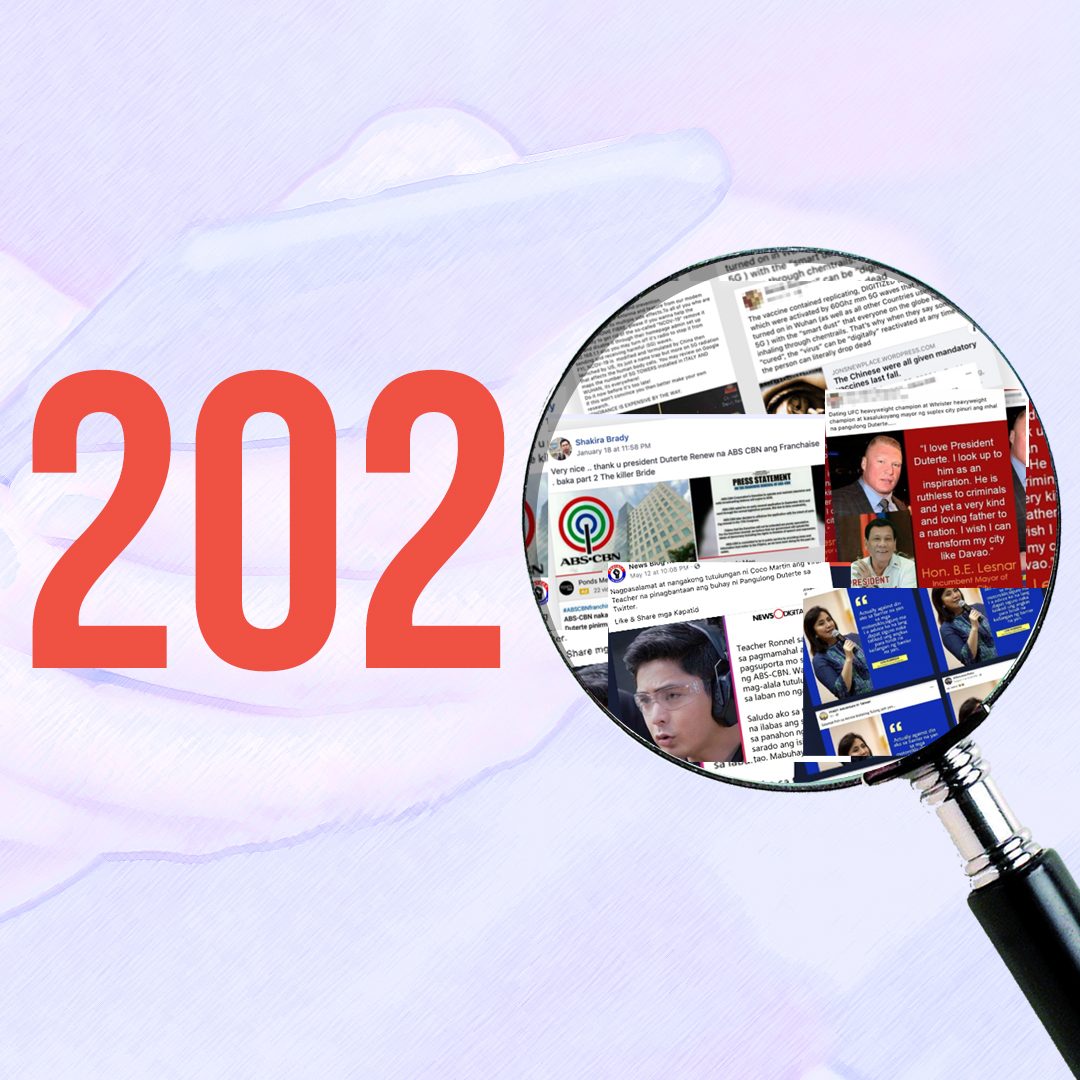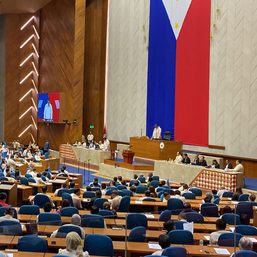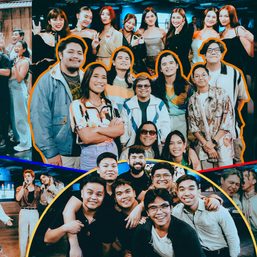SUMMARY
This is AI generated summarization, which may have errors. For context, always refer to the full article.

We might have spent most of 2020 at home, but that didn’t stop falsehoods and rumors from being spread on social media, in our private chat groups, and in some cases, even by public officials.
Rappler published 442 fact check articles from January to December, which makes up 54% of our total fact check articles from 2017 to 2020.
This doesn’t necessarily mean, however, that more lies circulated in 2020 than in previous years. We found more falsehoods because we ramped up our fact-checking efforts and aimed to increase the number of articles we published, not only to call out potentially harmful misleading information, but also to aid us in our studies on disinformation. (READ: Gov’t platforms being used to attack, red-tag media)
Since 2017, Rappler has fact checked content from more than 132 Facebook pages and Facebook 42 groups. Based on CrowdTangle data, as of 2020, these pages have a total 21,999,005 likes, while the groups have a total 3,156,557 members, which speaks about the potential reach of their posts.
However, it’s possible that one account liked more than one of the pages or groups on the list. It’s also possible that a person who liked a page or was a member of a group did not see the false posts that we checked, due to Facebook’s algorithm.
According to our data, the false posts on Facebook that we debunked in 2020 alone had more than 576,790 shares, 586,619 comments, and 1,679,473 reactions.
What – or who – were our fact checks about in 2020?
We took a look at all 442 articles we published from January to December and labeled them according to the topics they covered. Some fact checks fell under more than one topic and were labeled as such. For example, fact checks about President Rodrigo Duterte also fell under fact checks about public officials.
We also looked at which subjects and personalities were talked about the most, if there were any mentioned in the claim. Like our data on topics, some false claims involved more than one personality and were labeled accordingly.
Here’s what we found.
COVID-19 dominated 2020 disinformation
It’s no surprise that most of the false claims that circulated on social media in 2020 were about the COVID-19 pandemic. The fact checks that Rappler published about COVID-19 made up 40% of the total, starting with forwarded messages that claimed there were confirmed cases in the Philippines as early as January 24. The Department of Health confirmed the first case of what was then called the 2019 novel coronavirus on January 30.
Lies about the pandemic included cures and preventive measures, conspiracy theories and predictions, policies implemented by governments, and falsely attributed statements, among others. (READ: Fact-checking: A year of infodemic)
The impact of the falsehoods stemming from the pandemic was wide-reaching, affecting multiple aspects of our lives. It touched on most of the other popular topics for fact checks, including public officials, fake quotes, President Duterte, other countries, and the media.
Some of the most viral posts that we fact-checked were claims related to COVID-19. One claim, which circulated in July 2020, said that a Russian university had completed clinical trials for the first COVID-19 vaccine. It racked up 95,467 shares, 33,943 comments, and 362,888 reactions.
Another false claim said that a Filipino living in America got cured of COVID-19 after drinking salt and warm water. This gained 66,542 shares, 21,620 comments, and 204,462 reactions.
Fact-checking current events
Other topics that were most fact-checked reflect the major events that happened in 2020.
Fact checks about the media included unfounded rumors about ABS-CBN’s franchise renewal, while fact checks about disasters included false claims that spread during and after Taal Volcano’s eruption in January, as well as the back-to-back typhoons that hit the country in November.
Apart from disasters that occurred abroad, false information about countries hit hard by the coronavirus also became prevalent. These included false information about China, the epicenter of the outbreak, as well as Italy.
This trend in our fact checks may have been brought about by our decision to prioritize claims relevant to the current news cycle, have the potential to damage the subject’s reputation, or have the potential to go viral. We also prioritized claims that could affect public safety.
Another factor that could have influenced this outcome was the crowdsourcing of the claims we checked.
Most of the claims that we fact-checked in 2020 also came from emails from our readers and from Claim Check, a monitoring tool that Facebook makes available to their 3rd party fact-checking partners.
Towards the end of 2020, we even had volunteers who helped us spot and verify misleading claims. These volunteers attended the fact-checking webinars that we held throughout 2020. They’re also part of the “Fact-Checking in the Philippines” Facebook group, where members share posts for verification.
Because of the nature of our sources, the majority of the claims we fact-checked in 2020 were found and spread on Facebook. Even YouTube links and screenshots of messages spread through text or chat apps that contained false claims were spotted on Facebook.
One of the most viral posts that we disproved falsely claimed that Meralco bills for March and April 2020 were now free. A YouTube video that perpetuated this claim acquired 141,370 shares, 270,329 comments, and 427,181 reactions. It is now unavailable.
Duterte – subject, perpetrator of lies
Most of the claims that circulated in 2020 did not mention specific public figures, like those on conspiracy theories and other rumors about COVID-19 and supposed photos of disaster-struck areas.
But when a public figure was mentioned, President Duterte was usually the subject – he was mentioned in around 13% of our fact checks this year.
Several of these articles debunked claims that attempted to paint him in a positive light, such as fake quote cards of personalities praising him. Many of these featured well-known persons such as national leaders and celebrities, as well as some fictional characters misrepresented as real people.
We also saw multiple misleading comparisons between Duterte ‘s administration and those of previous presidents, with a recurring theme of “disente” (decent) versus “bastos” (indecent).
Fact checks about the President also included those that debunked lies of his own. In particular, the lies we debunked from him centered around COVID-19 – claims that gasoline or diesel can be used to disinfect against the virus, that transmission can only happen through contact with other people, and that the Philippines was the first to impose a lockdown in Asia.
Falsehoods surround celebrities, media, public officials
Below are the 10 subjects that were most mentioned in our fact checks in 2020.
Celebrities were frequent subjects of false claims, with around 8% of our fact check articles mentioning at least one celebrity. Most of these were death hoaxes that Rappler fact-checked because of virality or relevance to current events.
For example, we fact-checked a rumor that Vanessa Bryant died in February, shortly after the death of her husband, NBA legend Kobe Bryant, and their daughter Gianna. In another instance, we fact-checked a claim that comedian Michael V supposedly died of COVID-19 soon after he confirmed he was positive for the disease.
Some celebrities also became subjects of false claims after they spoke out against the administration. For one, after actors Coco Martin and Angel Locsin became vocal about the ABS-CBN shutdown, fake quotes and other hoaxes about them circulated.
Following celebrities closely was Vice President Leni Robredo, who was mentioned in 6% of the fact check articles. Most of the rumors that were fact-checked about the Vice President were about things she supposedly said or did, like making absurd proposals such as social distancing while playing basketball and facing backward when riding a motorcycle.
Tied with Robredo was ABC-CBN, which was also mentioned in 6% of Rappler’s fact checks. These included claims regarding its franchise renewal and protests against the shutdown.
With uncertainty still hovering this year amid the ongoing pandemic, we must be aware of these trends to stay vigilant against attempts to sow confusion and hatred. – Rappler.com
Add a comment
How does this make you feel?





There are no comments yet. Add your comment to start the conversation.